- Home
- Robert Jordan
Conan the Unconquered Page 7
Conan the Unconquered Read online
Page 7
It was the lack of guards that worried the Cimmerian. True, the avowed purpose of the tower room was to teach the Cult’s disciples the worthlessness of wealth, but nothing in Conan’s near twenty years led him to believe than any sane man would leave wealth unwatched and unprotected by iron bars and locks.
The tower walls were polished, offering no crevices for fingers or toes, not even those of one familiar with the sheer cliffs of Cimmeria. He looked down. The tiles of the walk were scribed in an unusual pattern of tiny crosshatches. Any one of them could be the trigger to a trap, letting onto pits filled with Kothian vipers or the deadly spiders of the Turanian steppes.
He had seen such before. Yet the place for that sort of device was before the archway. There a marble-laid path led toward the tower, stopping at the edge of the tiles. Kneeling, he examined the joining and smiled. The marble slab stood two fingerwidths higher than the tiles, and its lip was shiny, as if something were often rubbed against it. And from that low angle he could see two lines of wear, spaced at the width of the marble, stretching toward the tower arch. Here was located the trap—it did not matter what it was—and something was laid atop these tiles to make a way for the members of the cult to enter the tower. So much, he thought, for the worthlessness of wealth.
Cocking an ear for sounds elsewhere in the compound, he strode down the marble walk away from the tower, counting his steps. Silence. At least Akeba had raised no alarm as yet. At forty paces he turned around. The tower he could see dimly, but the arch that would be his target was no more than a smudge at its base. Hastily he refastened his sword belt around his chest and over one shoulder, so the nubby leather sheath hung down his back. It would not do to have the blade tangle in his feet at the wrong time.
With a deep breath he began to run, legs driving, broad chest heaving like a bellows in the effort for speed and more speed. The width of tiles was clear, then the archway. Almost on the instant he felt the edge of the marble beneath his boot and sprang, flying through the night air. With a thump his toes landed just inside the arch. He tottered on the edge of toppling back, fingers scrabbling for the rim of the archway. For an infinite moment he hung poised to drop into the trap. Then, slowly, he drew himself into the tower.
Laughing softly, he drew his sword and moved deeper inside. Try to keep a Cimmerian out, he thought.
On the ground level of the tower were several rooms, but the doors to all of them were locked. Still, what he wanted was above, and a spiraling stone stair led up from a central antechamber. Sword questing ahead, he climbed careful step by careful step. The first trap did not mean there were not others. Without incident, though, he came to the top of the stair, and to the chamber atop the tower.
Hammered silver on the domed roof reflected and magnified the moonlight, turning it into palely useful illumination that filtered into the chamber. Half-a-dozen archways, worked in delicate filigree, let onto the narrow-railed balcony. Open cabinets, lacquered over gilded scrollwork, stood scattered about the mosaicked floor, displaying priceless jewels on velvet cushions. A crown of rubies and pearls, fit for any king. A single emerald as big as a man’s fist. A score of finger-long matched sapphires, carved in erotic figures. More and more till the eyes of a mendicant priest oath-sworn to poverty would have lit with greed.
And there was the necklace, with its thirteen flawless rubies glowing darkly in the silvery light. Conan appraised it with a practiced eye before slipping it into his pouch. Perhaps it would make the woman who wore it irresistible to men, but then, most women seemed to believe gems of great-enough cost would do that, magic or no. This Davinia would get a bargain for her hundred gold pieces, in any case. His gaze ran around the room once more. Here was treasure worth ten thousand gold pieces. Ten times ten thousand. Ferian had been right; he could carry enough from this place to make him a rich man.
With difficulty but no regret, he put the thought firmly aside. He had turned from thieving, and what he did this night made no difference in that. But if he looted this chamber of all he could carry, he knew it would not be so easy to leave that life again. And he did not doubt that whatever gold he got for these things would last no longer than the gold he had received for other thefts. Such coin never stayed long.
“I hoped you would not come.”
Conan spun, sword raised, then lowered it with a grin. “Emilio! I thought you were dead, man. You can have this Mitra-accursed necklace, and be welcome to it.”
The tall Corinthian came the rest of the way up the stairs into the tower-top chamber. He had sword and dagger in hand. “’Tis a fit punishment, do you not think, guarding forever that which I intended to steal?”
Hair stirred on the back of Conan’s neck. “You are ensorceled?”
“I am dead,” Emilio replied, and lunged. Conan dodged aside, and the other’s blade passed him to shatter the treasure-laden shelves of a cabinet. Snake-like, Emilio whirled after him, but he circled to keep cabinets between them.
“What foolishness is this you speak?” he demanded. “I see a man before me, not a shade.”
Emilio’s laugh was hollow. “I was commanded to kill all who came to this tower in the night, but naught was said against speaking.” He continued to move in slow deadliness; Conan moved the other way, keeping a lacquered cabinet between them. “I was taken in this very chamber, with the necklace in my hand. So near did I come. For my pains a hollow ponaird was thrust into my chest. I watched my heart’s blood pump into a bowl, Cimmerian.”
“Crom,” Conan muttered, tightening his grip on his sword. To kill a friend was ill, even one spell-caught and commanded to slay, yet to kill was better than to die at that friend’s hands.
“Jhandar, whom they call Great Lord, took life from me,” Emilio continued, neither speeding nor slowing his advance. “Having taken it, he forced some part of it back into this body that once was mine.” His face twisted quizzically. “And this creature that once was Emilio the Corinthian must obey. It must … obey.”
Abruptly Emilio’s foot lashed out against the lacquered cabinet. In a crash of snapping wood it toppled toward the young Cimmerian. Conan leaped back, and Emilio charged, boots splintering delicate workmanship, carelessly scattering priceless gems.
Conan’s blade flashed upward, striking sparks from the other’s descending steel. Dagger darting to slide beneath Conan’s ribs, the Corinthian’s wrist slapped into his hand and was seized in an iron grip. Locked chest to chest they staggered out onto the balcony. Conan’s knee rose, smashing into Emilio’s crotch, but the reanimated corpse merely grunted. Risking freeing the Corinthian’s sword, Conan struck with his hilt into Emilio’s face. Now the other man fell back. Conan’s blade slashed the front of his old friend’s tunic, and Emilio leaped back again. Abruptly the backs of his legs struck the railing, and for an instant he hung there, arms waving desperately for balance. And then he was gone, without a cry. A sickening thud came from below.
Swallowing hard, Conan stepped to the rail and looked toward a ground that seemed all flitting shadows. He could make out no detail, but that Emilio had lived through the fall—if, indeed, he had lived before he fell—was beyond his belief. It was ill to kill a friend, no matter the need. There could be no luck in it.
Resheathing his sword, he hurried down the stairs. At the archway he stopped. Emilio’s body lay sprawled just outside, and its fall had triggered the trap. From the archway to the marble path, thin metal spikes the length of a man’s forearm had thrust up through the tiles. Four of them transfixed the Corinthian.
“Take a pull on the hellhorn for me,” Conan muttered.
But there was still Akeba to meet, and no time for mourning. Quickly he picked his way between the spikes and set out at a dead run for the landmark they had chosen, the tallest tower in the compound, its high golden dome well visible even by moonlight.
Abruptly a woman’s scream pierced the night, and was cut off just as suddenly. With an oath Conan drew his sword and redoubled his speed. That cry had com
e from the direction of the gold-topped tower.
Deep in the compound a gong sounded its brazen alarm, then a second and a third. Distant shouts rose, and torches flared to life.
Conan dashed into the shadows at the base of the tower, and stopped to stare in amazement. Akeba was there, holding a slender sable-skinned beauty in saffron robes, one arm pinning her arms, his free hand covering her mouth. Large dark eyes glared fiercely at him from above the soldier’s fingers.
“This is your daughter?” Conan asked, and Akeba nodded, an excited smile splitting his face.
“Zorelle. I could not believe my luck. She was fetching water to the women’s quarters. No one saw me.”
The shouts had grown louder, and the torches now seemed to rival the stars in number.
“That does not seem to matter, at the moment,” Conan said drily. “It will be no easy task to remove ourselves from this place, much less a girl who doesn’t seem to want to go.”
“I am taking her out of here,” the Turanian replied, his voice hard.
“I did not suggest otherwise.” He would not leave any woman to the mercies of Emilio’s destroyer. “But we must … hsst!” He motioned for silence.
An atavistic instinct rooted deep inside the Cimmerian shouted that he was being watched by inimical eyes, eyes that drew closer by the moment. But his own gaze saw nothing but deceptively shifting shadows. No. One shadow resolved itself into a man in black robes. Even after Conan was certain, though, he found it difficult to keep his eyes on that dim figure. There was something about it that seemed to prevent the eye from focusing on it. The hairs on his neck rose. There was sorcery of a kind here, sorcery most foul and unnatural throughout this place.
“Mitra!” Akeba swore suddenly, jerking his hand from his daughter’s mouth. “She bit me!”
Twisting in his loosened grasp, she raked at his face with her nails. At the distinct disadvantage of struggling with his own daughter, he attempted to keep his grip on her while avoiding being blinded. Under the circumstances it was an unequal fight. In an instant she was free and running. And screaming.
“Help! Outsiders! They are trying to take me! Help!”
“Zorelle!” Akeba shouted, and ran after her.
“Zandru’s Hells!” Conan shouted, and followed.
Of a sudden the black-robed man was before the girl. Gasping, she recoiled.
The strange figure’s hand reached out, perhaps to brush against her face. Her words stopped on the instant, and she dropped as if her bones had melted.
“Zorelle!” The scream from Akeba held all the anguish that could be wrung from a man’s throat.
Primitive instinct, primed now, reared again in Conan. Diving, he caught Akeba about the waist and pulled him to the ground. The air hummed as if a thousand hornets had been loosed. Arrows sliced through the space where they had stood, toward the man in black. And before Conan’s astounded gaze the man, hands darting like lightning, knocked two shafts aside, seized two more from the air, then seemed to slide between the rest and disappear.
Close behind their arrows came half-a-score Hyrkanians, waving short horn bows and curved yataghans as they ran. Two veered toward Conan and Akeba, but another shouted gutturally, “No! Leave them! ’Tis Baalsham we want!” The squat Hyrkanians ran on into the night.
Shaking his head, Conan got slowly to his feet. He had no notion what was happening, and was, in fact, not sure that he wanted to know. Best he got on about his business and left the rest to those already involved. Screams had been added to the shouts in the distance, and the pounding of hundreds of panic-stricken feet. Fire stained the sky as a building exploded in flame.
Akeba crawled on hands to knees to his daughter. Cradling her in his arms, he rocked back and forth, tears streaming down his flat cheeks. “She is dead, Cimmerian,” he whispered. “He but touched her, yet she … .”
“Bring your daughter,” Conan told him, “and let us go. We have no part in what else happens here this night.”
The Turanian lowered Zorelle carefully, drew his tulwar and examined the blade. “I have blood to avenge, a man to kill.” His voice was quiet, but hard.
“Revenge takes a cool head and a cold heart,” Conan replied. “Yours are both filled with heat. Remain, and you will die, and likely never see the man who killed her.”
Akeba twisted to face the Cimmerian, his black eyes coals in a furnace. “I want blood, barbar,” he said hoarsely. “If need be, I will begin with yours.”
“Will you leave Zorelle for the worms and the ravens, then?”
Akeba squeezed his eyes shut and sucked in a long, hissing breath. Slowly he returned his blade to its sheath and, stooping, gathered his daughter in his arms. When he straightened his face and voice were without expression. “Let us be gone from this accursed place, Cimmerian.”
A score of saffron-robed men and women appeared out of the dark and fled past as if terror driven. None glanced at the two men, one holding a girl’s body in his arms.
Twice more as they headed for the wall they saw clusters of cult members, running mindlessly. Behind them the shouts and screams had become a solid wave of sound. Two fires now licked at the sky.
They ran into the bushes near where they had crossed the wall, and, like a covey of quail, cult members burst from hiding. Some fled shrieking; others tried to dash past the two men, almost trampling them.
Conan cuffed a pair of shaven-headed men aside and shouted, “Go Akeba! Take her on!” He knocked another man sprawling, seized a woman to toss her aside … and stopped. It was Yasbet.
“You!” she shouted.
Without pausing, Conan threw her over his shoulder and scrambled on, scattering the few who remained to try to hinder him. Yasbet’s feet fluttered in futile kicking, and her small fists pounded at his broad back.
“Let me down!” she screamed. “You have no right! Loose me!” They reached the wall; he let her down. She stared at him with the haughtiness of a dowager queen. “I will forget this if you go now. And for the kindness you did me earlier, I’ll not tell—” She broke off with a shriek as he bent to cut a strip from her robe with his dagger. In a trice her hands were bound behind her, and before she could more than begin another protest he added a gag and a hobble between her ankles.
Akeba had taken care of the grapnels. Two ropes dangled from the top of the wall. “Who is she?” he asked, jerking his head toward Yasbet.
“Another wench who should not be left to this cult,” Conan replied. “Climb up. I’ll attend to your daughter so you can draw her after you.”
The Turanian hesitated, then said, “The live girl first. There may not be time for both.” Without waiting for a reply he scrambled up one of the ropes.
Despite her struggles, Conan fastened the end of the rope about Yasbet beneath her arms. In moments her muffled squeals were rising into the air. Hurriedly he did the same to Zorelle’s body with the other rope. As he was pulled up, he waited, watching and listening for Hyrkanians, for cult members, for almost anything, considering the madness of the night. He listened and waited. And waited. Akeba had to climb down on the outside, he knew, and free one of the girls before he could return atop the wall and lower a rope to Conan, but it seemed to be taking a very long time.
The rope end slapped the wall in front of his face, and he could not stop a sigh of relief. At the top of the wall he found himself face to face with Akeba. “For a time there,” he said, “I almost thought you’d left me.”
“For a time,” Akeba replied flatly, “on the ground outside with my daughter, I almost did.”
Conan nodded, and said only, “Let us go while we can.”
Dropping to the ground they picked up the women—Conan Yasbet and Akeba Zorelle—and ran for Sharak and the horses. The cacophony of conflict still rose within the compound behind them.
VIII
The red glare of fire in the night glinted on Jhandar’s face as he turned from the window. The shouts of initiates carrying water to fight th
e blazes rang through the compound, but one building, at least, was too far gone in flame to be saved.
“Well?” he demanded.
Che Fan and Suitai exchanged glances before the first-named spoke. “They were Hyrkanians, Great Lord.”
The three men stood in the antechamber to Jhandar’s apartments. The austerity of decoration that the necromancer invoked for his garb was continued here. Low, unadorned couches dotted the floor that was, if marble, at least plain and bare of rugs, as the walls were bare of tapestries and hangings.
“I know they were Hyrkanians!” Jhandar snarled. “I could hear them shouting, ‘Death to Baalsham!’ Never did I think to hear that name again.”
“No, Great Lord.”
“How many were there?”
“Two score, Great Lord. Perhaps three.”
“Three score,” Jhandar whispered. “And how many yet live?”
“No more than a handful, Great Lord,” Che Fan replied. “Well over a score perished.”
“Then perhaps a score still live to haunt me,” Jhandar said pensively. “They must be found. There will be work for the two of you, then, you may be sure.”
“Great Lord,” Suitai said, “there were others in the compound tonight. Not Hyrkanians. One wore the helmet of a Turanian soldier. The other was a tall man, pale of skin.”
“A barbarian?” Jhandar asked sharply. “With blue eyes?”
“Blue eyes?” Suitai asked incredulously, then recovered himself. “It was dark, Great Lord, and with the fighting I could not draw near enough to see. But they robbed the Tower of Contemplation, taking the necklace of thirteen rubies and slaying the thief you set there as guard.” He hesitated. “And they killed one of the initiates, Great Lord. The girl Zorelle.”
The necromancer made a dismissive gesture. He had marked the girl for his bed, in time, but her life or death was unimportant. But the necklace, now. The thief had come for that same bit of jewelry. There had to be a link there.
“Wait here,” he snarled.

 Conan the Unconquered
Conan the Unconquered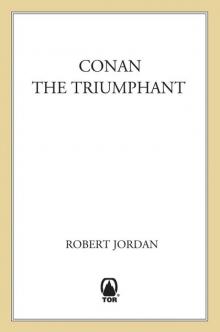 Conan the Triumphant
Conan the Triumphant The Eye of the World
The Eye of the World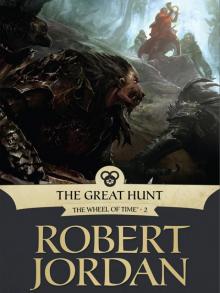 The Great Hunt
The Great Hunt Conan the Victorious
Conan the Victorious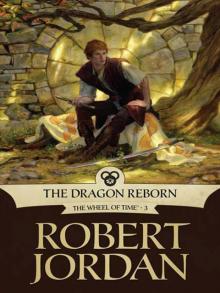 The Dragon Reborn
The Dragon Reborn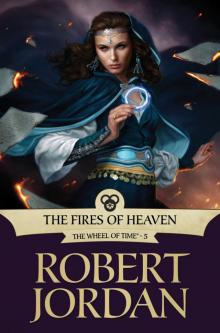 The Fires of Heaven
The Fires of Heaven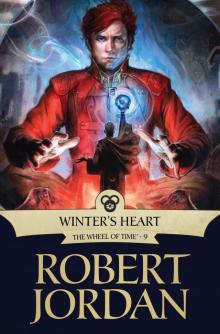 Winter's Heart
Winter's Heart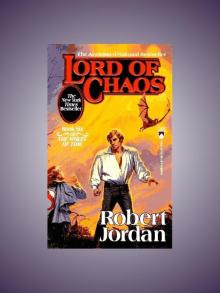 Lord of Chaos
Lord of Chaos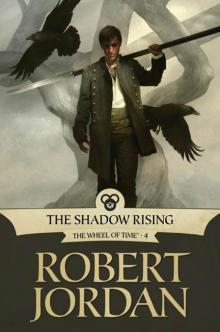 The Shadow Rising
The Shadow Rising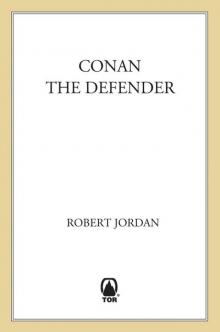 Conan the Defender
Conan the Defender The Strike at Shayol Ghul
The Strike at Shayol Ghul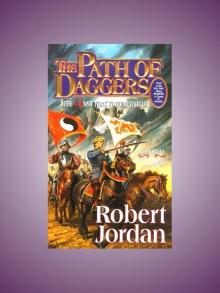 The Path of Daggers
The Path of Daggers A Memory of Light
A Memory of Light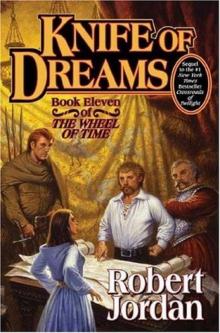 Knife of Dreams
Knife of Dreams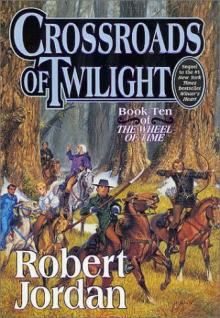 Crossroads of Twilight
Crossroads of Twilight Conan the Invincible
Conan the Invincible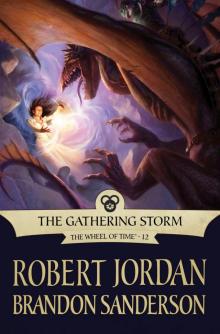 The Gathering Storm
The Gathering Storm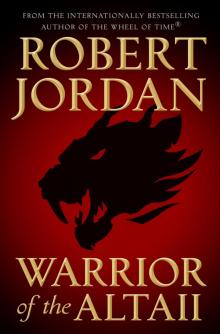 Warrior of the Altaii
Warrior of the Altaii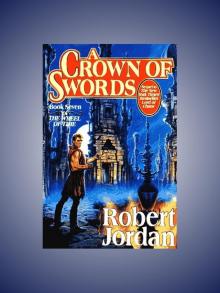 A Crown of Swords
A Crown of Swords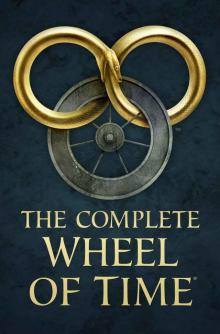 The Wheel of Time
The Wheel of Time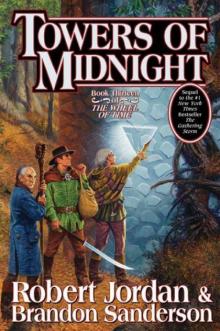 Towers of Midnight
Towers of Midnight Conan Chronicles 2
Conan Chronicles 2 Conan the Magnificent
Conan the Magnificent New Spring
New Spring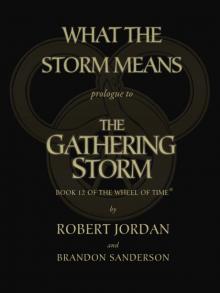 What the Storm Means
What the Storm Means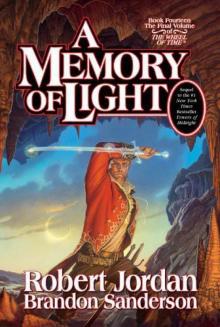 A Memory of Light twot-14
A Memory of Light twot-14 New Spring: The Novel
New Spring: The Novel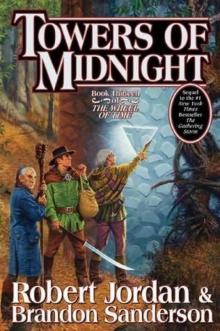 Towers of midnight wot-13
Towers of midnight wot-13 A Memory Of Light: Wheel of Time Book 14
A Memory Of Light: Wheel of Time Book 14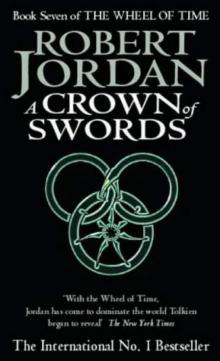 A Crown of Swords twot-7
A Crown of Swords twot-7 Lord of Chaos twot-6
Lord of Chaos twot-6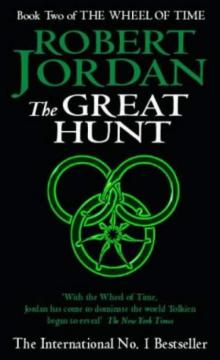 The Great Hunt twot-2
The Great Hunt twot-2 The Shadow Rising twot-4
The Shadow Rising twot-4![Wheel of Time-11] Knife of Dreams Read online](http://i1.bookreadfree.com/i1/04/03/wheel_of_time-11_knife_of_dreams_preview.jpg) Wheel of Time-11] Knife of Dreams
Wheel of Time-11] Knife of Dreams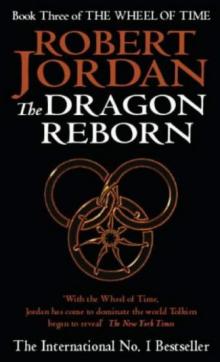 The Dragon Reborn twot-3
The Dragon Reborn twot-3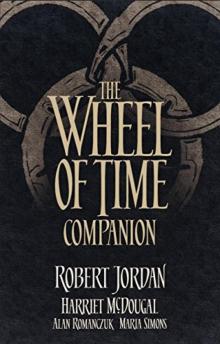 The Wheel of Time Companion
The Wheel of Time Companion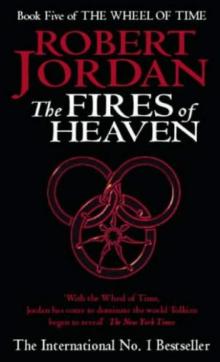 The Fires of Heaven twot-5
The Fires of Heaven twot-5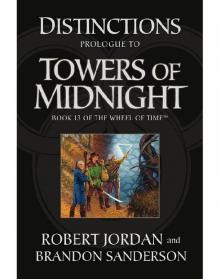 Prologue to Towers of Midnight
Prologue to Towers of Midnight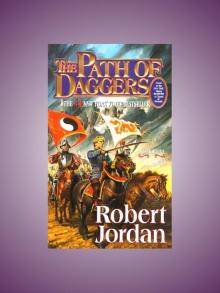 The Path of Daggers - The Wheel of Time Book 8
The Path of Daggers - The Wheel of Time Book 8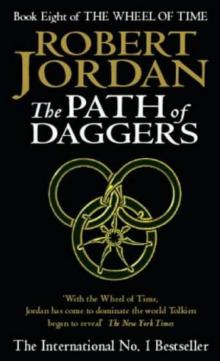 The Path of Daggers twot-8
The Path of Daggers twot-8 By Grace and Banners Fallen: Prologue to a Memory of Light
By Grace and Banners Fallen: Prologue to a Memory of Light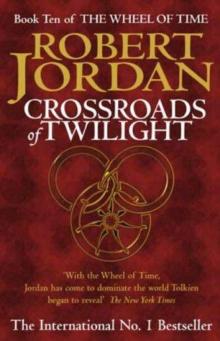 Crossroads of Twilight twot-10
Crossroads of Twilight twot-10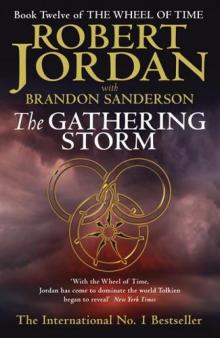 The Gathering Storm twot-12
The Gathering Storm twot-12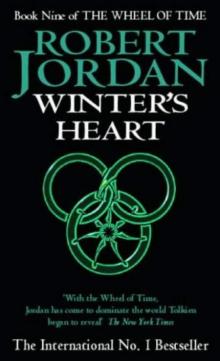 Winter's Heart twot-9
Winter's Heart twot-9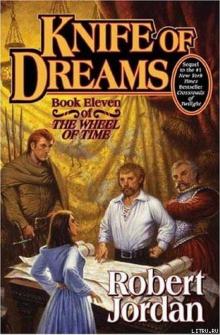 Knife of Dreams twot-11
Knife of Dreams twot-11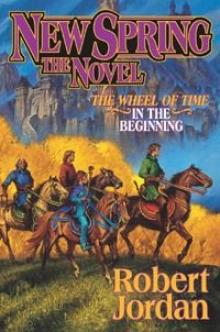 New Spring: The Novel (wheel of time)
New Spring: The Novel (wheel of time)